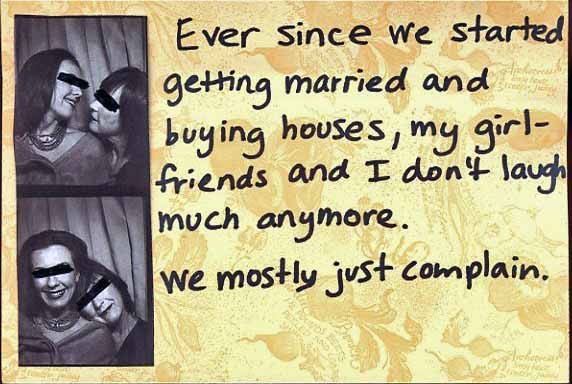acaciaroots:dynastylnoire:socimages:The constant pop cultural message that women are wetting their p
acaciaroots:dynastylnoire:socimages:The constant pop cultural message that women are wetting their pants to get married strategically obscures the fact that women are happier when single. By Lisa Wade, PhDTo Post Secret, a project that collects personal secrets written artistically onto postcards, someone recently sent in the above bombshell: “Ever since we started getting married and buying houses,” she writes, “my girlfriends and I don’t laugh much anymore.”Her personal secret is, in fact, a national one. It’s part of what has been called the “paradox of declining female happiness.” Women have more rights and opportunities than they have had in decades and yet they are less happy than ever in both absolute terms and relative to men.Marriage is part of why. Heterosexual marriage is an unequal institution. Women on average do more of the unpaid and undervalued work of households, they work more each day, and they are more aware of this inequality than their husbands. They are more likely to sacrifice their individual leisure and career goals for marriage. Marriage is a moment of subordination and women, more so than men, subordinate themselves and their careers to their relationship, their children, and the careers of their husbands.Compared to being single, marriage is a bum deal for many woman. Accordingly, married women are less happy than single women and less happy than their husbands, they are less eager than men to marry, they’re more likely to file for divorce and, when they do, they are happier as divorcees than they were when married (the opposite is true for men) and they are more likely than men to prefer never to remarry.The only reason this is surprising is because of the torrent of propaganda we get that tells us otherwise. We are told by books, sitcoms, reality shows, and romantic comedies that single women are wetting their pants to get hitched. Men are metaphorically or literally drug to the altar in television commercials and wedding comedies, an idea invented by Hugh Hefner in the 1950s (before the “playboy,” men who resisted marriage were suspected of being gay). Not to mention the wedding-themed toys aimed at girls and the ubiquitous wedding magazines aimed solely at women. Why, it’s almost as if they were trying very hard to convince us of something that isn’t true.But if women didn’t get married to men, what would happen? Marriage reduces men’s violence and conflict in a society by giving men something to lose. It increases men’s efforts at work, which is good for capitalists and the economy. It often leads to children, which exacerbate cycles of earning and spending, makes workers more reliable and dependent on employers, reduces mobility, and creates a next generation of workers and social security investors. Marriage inserts us into the machine. And if it benefits women substantially less than men, then it’s no surprise that so many of our marriage promotion messages are aimed squarely at them.Lisa Wade is a professor at Occidental College and the co-author of Gender: Ideas, Interactions, Institutions. Find her on Twitter, Facebook, and Instagram.GOT DAMNWell shit. -- source link
Tumblr Blog : socimages.tumblr.com
